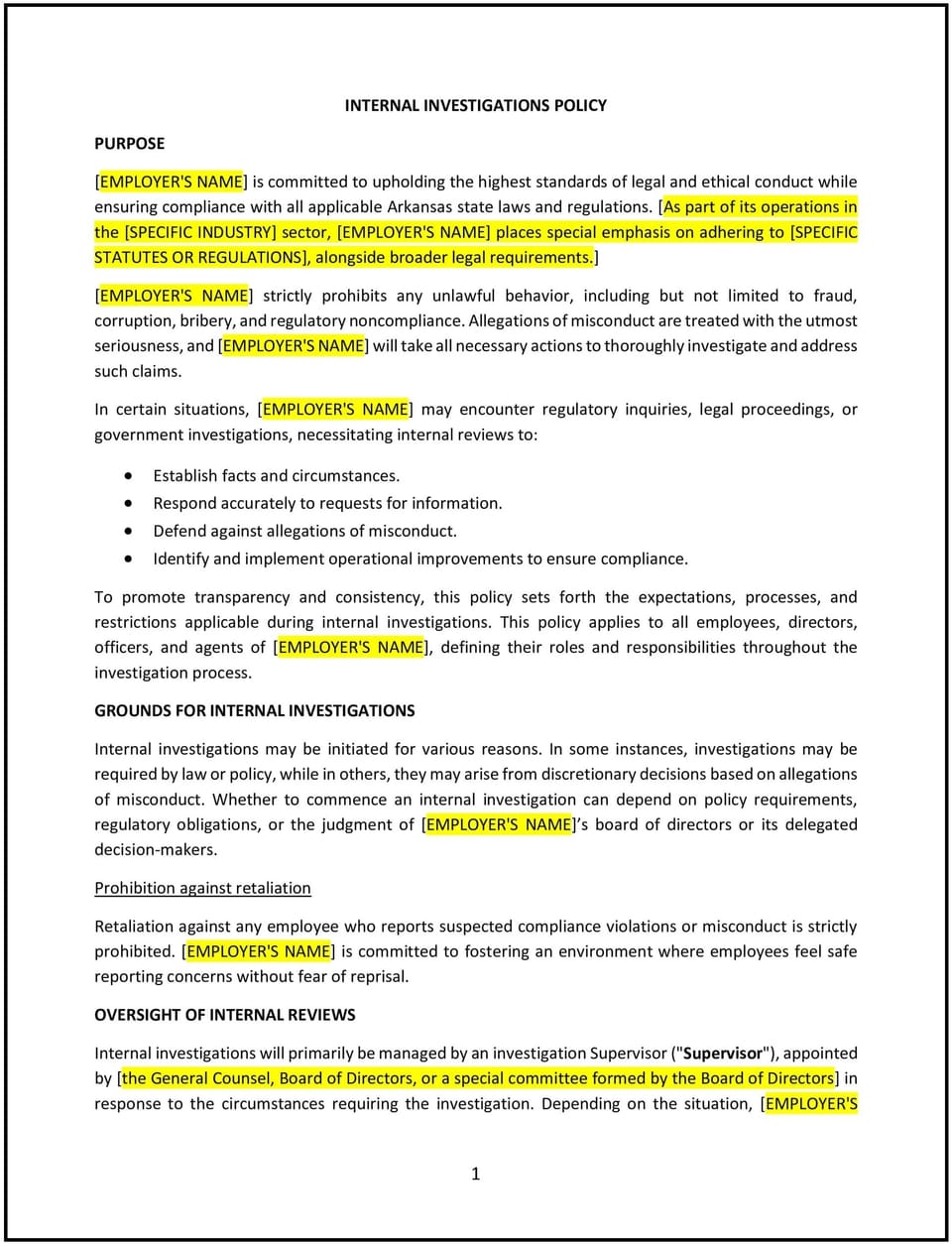Internal investigations policy (Arkansas): Free template

Internal investigations policy (Arkansas)
In Arkansas, an internal investigations policy provides businesses with a structured approach for addressing complaints, misconduct, or violations of workplace policies. This policy ensures a fair, thorough, and confidential investigation process while maintaining compliance with state and federal laws.
This policy outlines the roles and responsibilities of investigators, the steps for conducting investigations, and procedures for resolving issues. By implementing this policy, Arkansas businesses can foster trust, minimize risks, and ensure compliance with employment and legal standards.
How to use this internal investigations policy (Arkansas)
- Define the scope: Clearly state the types of issues covered by the policy, such as harassment, discrimination, or policy violations.
- Assign responsibilities: Designate individuals or teams, such as HR or legal counsel, responsible for conducting investigations and maintaining confidentiality.
- Outline investigation steps: Provide a step-by-step process, including gathering evidence, interviewing relevant parties, and documenting findings.
- Ensure confidentiality: Establish protocols for protecting the privacy of all parties involved in the investigation to the extent possible.
- Communicate outcomes: Clarify how the business will address findings, including disciplinary actions or remediation efforts, while complying with legal requirements.
Benefits of using this internal investigations policy (Arkansas)
This policy offers several advantages for Arkansas businesses:
- Enhances workplace trust: Demonstrates the business’s commitment to addressing issues promptly and fairly.
- Reduces legal risks: Ensures compliance with Arkansas and federal employment laws, minimizing the risk of lawsuits or penalties.
- Promotes consistency: Establishes a uniform approach to handling investigations, reducing bias or errors.
- Protects confidentiality: Safeguards sensitive information, maintaining trust among employees and stakeholders.
- Supports compliance: Aligns with Arkansas-specific labor regulations and federal standards, ensuring lawful and ethical practices.
Tips for using this internal investigations policy (Arkansas)
- Address Arkansas-specific considerations: Include any state-specific labor or legal requirements relevant to workplace investigations.
- Provide training: Train managers and HR personnel on conducting fair and compliant investigations.
- Document thoroughly: Keep detailed records of investigation steps, findings, and resolutions to ensure transparency and accountability.
- Encourage reporting: Create a safe environment where employees feel comfortable raising concerns without fear of retaliation.
- Review regularly: Update the policy to reflect changes in legal requirements or business practices.
Q: How does this policy benefit the business?
A: This policy ensures issues are addressed fairly and consistently, minimizes legal risks, and supports compliance with Arkansas and federal laws, fostering trust in the workplace.
Q: What types of issues are covered under this policy?
A: The policy covers issues such as harassment, discrimination, theft, fraud, policy violations, or any complaints requiring an internal review.
Q: How does this policy support compliance with Arkansas laws?
A: The policy aligns with Arkansas labor laws and federal regulations to ensure investigations are conducted lawfully and ethically.
Q: Who is responsible for conducting internal investigations?
A: Designated individuals, such as HR professionals or legal counsel, are responsible for ensuring investigations are thorough, impartial, and compliant with the policy.
Q: How can the business ensure confidentiality during investigations?
A: The business should limit information sharing to those directly involved, secure all records, and communicate findings discreetly to maintain privacy.
This article contains general legal information and does not contain legal advice. Cobrief is not a law firm or a substitute for an attorney or law firm. The law is complex and changes often. For legal advice, please ask a lawyer.


